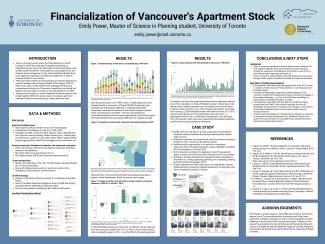
There is increasing concern about the financialization of rental housing, in which the ownership of apartment buildings is transferred to new firms that raise funds on financial markets, such as Real Estate Investment Trusts (REITs), private equity firms, and financial asset management corps. Scholarly research has suggested that such firms may be more likely to carry out evictions and/or raise rents and other fees to deliver higher returns to shareholders and unit holders (August 2020; August & Walks 2018). Recent scholarship has begun tracking the sales of rental buildings to these kinds of firms in Canada (August 2020; August & Walks 2018), the United States and Europe (Fields 2018; Fields and Uffer 2016; Nethercote 2019). Although Vancouver is a metropolitan region receiving significant investment into its housing market, there has not yet been a systematic analysis of which buildings have been purchased by such ‘financialized landlords’ that would allow answering rigorous questions regarding the impact of rental housing financialization.
This project will link together three hitherto-unexamined datasets to produce this systematic analysis for Metro Vancouver over the last five years (2016-2021, the years covered by the data). The first dataset, from BC Assessment, includes information on sale (conveyance) date and price paid, as well as information on the rental unit composition (but not rents). However, this dataset does not name the purchaser and seller. We propose to link this dataset to the data provided by the Land Title Survey Authority (LTSA) showing who has purchased the buildings, and who had previously owned them. The sales data will be systematically analyzed in order to show which firms have been purchasing which rental buildings. This will be used to determine not only the scale of activity of financialized firms over time (and in relation to non-financialized firms), but also if there are patterns related to the acquisition strategies of each of the active firms, including the location, size (number of units), and type of building. Finally, Altus has announced they will release a new dataset at the end of 2022 that will contain information on average rents for all rental buildings in Vancouver. When linked to the first two datasets, this will provide baseline data for Metro Vancouver upon which additional studies of the effects of financialization in the region can then be undertaken, including analyses of the effects of such differential ownership and title change on rent levels and eviction rates.